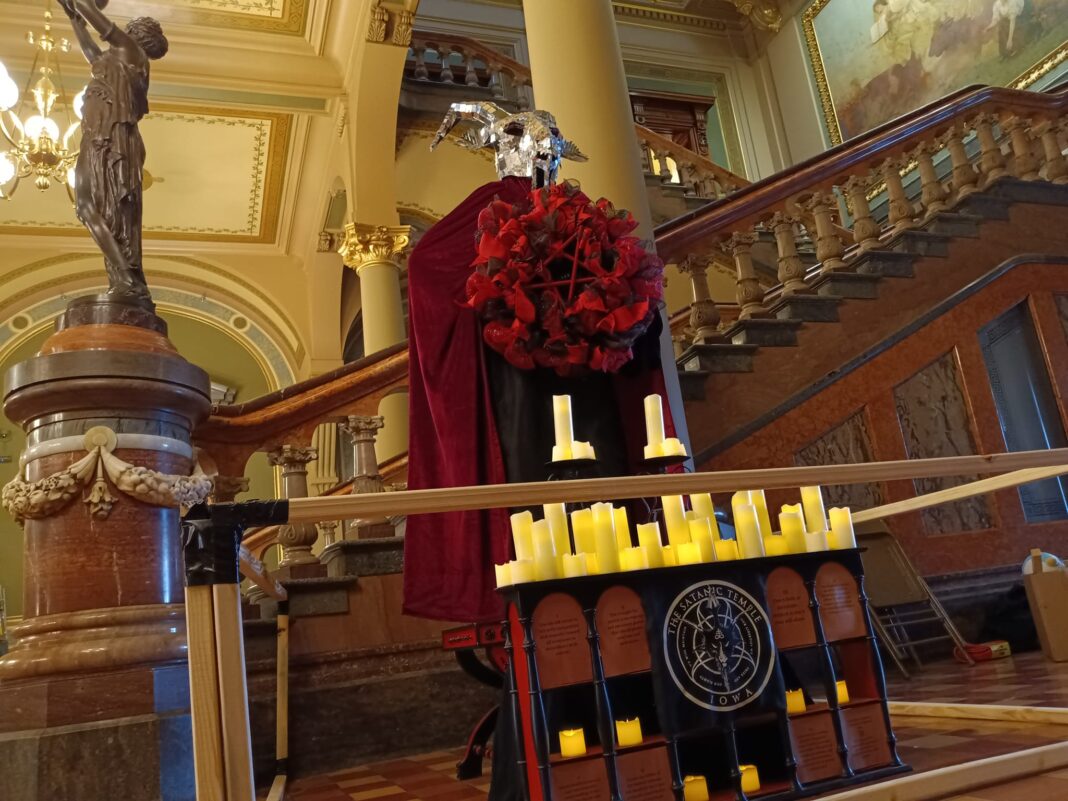Remember Michael Cassiday, the former congressional candidate from Mississippi, who last December decided to dismantle the Satanic Temple’s holiday display of Baphomet? Initially charged with a misdemeanor, Cassiday’s charges were later enhanced to a felony under Iowa’s hate crime statutes. However, one might argue that being charged with hating Satan is hardly the flex the prosecutors may have supposed.
While Iowa lawmakers and Governor Kim Reynolds expressed displeasure with the Satanic display, it was protected under Iowa law as an expression of religious freedom. However, while religious freedom is a cornerstone of our legal system, placing a Baphomet display in the Capitol during Christmas is undeniably antagonistic. The debate over religious freedoms aside, it’s an inescapable fact that Christianity has been, and remains, a foundational element of America’s cultural and moral fabric—a foundation many Christian’s fear is under threat.
Do we believe the founding fathers intended the First Amendment to protect practices like Satanism? It’s hard to imagine they foresaw such an application. The Temple’s display, perceived by many as a direct mockery of Christianity, appears to be a deliberate provocation. Cassiday’s decision to take matters into his own hands and the significant support he’s received through donations to his GiveSendGo account suggest a considerable number of people share this view.
Iowa senator proposes outlawing Satan.
In response to the controversy surrounding the display, Iowa State Senator Sandy Salmon introduced Senate File 2210, a bill aimed at outlawing satanic displays and worship on state property. Although the likelihood of the bill moving forward is slim, and its constitutionality remains in question, the introduction of such legislation underscores the perceived battle for the nation’s soul—a battle Iowa lawmakers are keenly aware of and are responding to accordingly.
Some people say that as Iowa goes, so does the nation, which is likely true. Iowa was the first state to legalize gay marriage. We all see now how that has turned out. One could argue legalizing gay marriage set up a slippery slope, legitimizing the rise in transgender issues we have seen sweep across the nation. Iowa and the country have suffered because of it. Men are using the bathrooms and changing rooms of women and young girls, competing in their sports, and forcing employers to be subject to their will. America has become paralyzed by a small percentage of people with gender dysphoria. Listen, I am not a cruel or mean person. I do not wish any ill will on anyone. But we cannot maintain a functioning society when members of the highest level of government can’t define a woman.
So what was religious freedom in America all about anyway?
The original colonies were not a melting pot of diverse religions; today, the United States still reflects a predominant preference. When Americans think of God, they typically envision the God of the Bible. The concept of religious freedom, as conceived by the founders, did not equate Islam and Judaism with Christianity on an equal footing. “In God We Trust,” a motto enshrined in law in 1955 and tracing back to the Civil War, is not a blanket endorsement for any deity of choice. It explicitly refers to the God of Abraham, Isaac, and Jacob—the God who sent His Son, Jesus Christ. This motto reflects a longstanding belief that the United States places its trust in the biblical God, a sentiment expected to endure until America is no more.
Religious freedom is not the freedom to hijack the dominant culture or claim parity, as light cannot comprehend darkness. Early Americans were not contemplating the rights of Islam, Buddhism, and undoubtedly not Satanism. The presumption that the founding fathers of the United States would protect a display praising Satan is preposterous.
The increasing secularism of America is disturbing, yet there remains a remnant committed to reviving our foundational values. As American society drifts further from its moral compass towards perdition, more individuals are awakening to our collective mistakes. We find ourselves in a pivotal battle between the forces of good and evil. America once stood as the ‘beacon on the hill,’ illuminating the path for others with its exceptionalism. However, today, there’s a trend to forsake our illustrious heritage in favor of a misunderstood concept of diversity, equity, and inclusion.
Salvation is found only in Christ — His life, death, and resurrection promise eternal life to all who believe. While offensive to unbelievers, Christians are not obligated to be sensitive to opposing faiths. We are commanded to preach the gospel, proclaiming Christ to all until his return. Our goal is not to compromise with the devil but rather convert all people to Christ.
While Michael Cassiday appears to have violated current laws, this incident underscores a deeper issue: our laws have strayed from their original intent. It’s time to reconsider the allowance of Satan worship on public property, aligning our legal framework more closely with foundational principles. Instead of condemning Cassiday, we should view him as a catalyst for reflection on how far society has drifted from its core values.
-
Evan Fields












